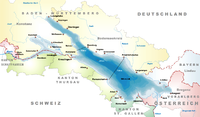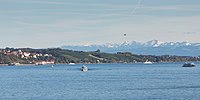
A fortification is a military construction designed for the defense of territories in warfare, and is used to establish rule in a region during peacetime. The term is derived from Latin fortis ("strong") and facere.
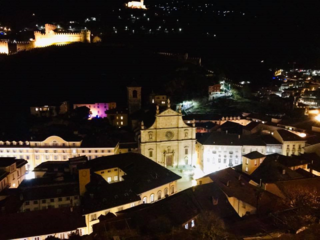
Bellinzona is a municipality, a historic Swiss town, and the capital of the canton of Ticino in Switzerland. The town is famous for its three castles that have been UNESCO World Heritage Sites since 2000.

Lenzburg Castle is a castle located above the old part of the town of Lenzburg in the Canton of Aargau, Switzerland. It ranks among the oldest and most important of Switzerland. The castle stands on the almost circular castle hill, which rises approximately 100 m (330 ft) over the surrounding plain but is only about 250 m (820 ft) in diameter. The oldest parts of the castle date to the 11th century, when the Counts of Lenzburg built it as their seat. The castle, its historical museum and the castle hill with its Neolithic burial grounds are listed as heritage sites of national significance.

Marienberg Fortress is a prominent landmark on the left bank of the Main river in Würzburg, in the Franconia region of Bavaria, Germany. It is a symbol of Würzburg and served as a home of the local prince-bishops for nearly five centuries. It has been a fort since ancient times, although most of the current structures were built in Renaissance and Baroque styles between the 16th and 18th centuries. After Gustavus Adolphus of Sweden conquered the area in 1631 during the Thirty Years' War, the castle was reconstructed as a Baroque residence. After it ceased to serve as residence of the Bishops of Würzburg, the fortress saw repeated action in the wars of the late 18th and 19th centuries. It was severely damaged by British bombs in March 1945 and only fully rebuilt in 1990. Today, it houses two museums.
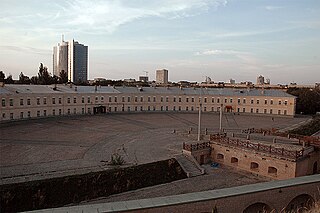
The Kyiv Fortress or Kiev Fortress is a historical and architectural monument complex of Russian fortifications in Kyiv, Ukraine built from the 17th through 19th centuries. Construction began after the 1654 Council in Pereiaslav, on the site of the already existing fortified monastery of Kyiv Pechersk Lavra. Located on the hills of the high right bank of the Dnieper, bounded on the north by the Klovsky ravine, on the south and west – by the slopes of the Lybid River valley.
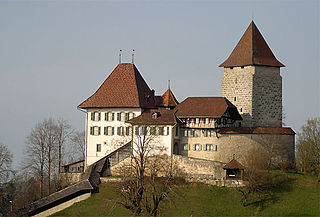
Trachselwald Castle is a castle in the municipality of Trachselwald in the canton of Bern, Switzerland. It is a Swiss heritage site of national significance.

Arbon is a historic town and a municipality and district capital of the district of Arbon in the canton of Thurgau in Switzerland.

The Old City is the medieval city center of Bern, Switzerland. Built on a narrow hill bordered on three sides by the river Aare, its compact layout has remained essentially unchanged since its construction during the twelfth to the fifteenth century. Despite a major fire in 1405, after which much of the city was rebuilt in sandstone, and substantial construction efforts in the eighteenth century, Bern's old city has retained its medieval character.

The Castles of Bellinzona are a group of fortifications located around the town of Bellinzona, the capital of the Swiss canton of Ticino. Situated on the Alpine foothills, the group is composed of fortified walls and three castles named Castelgrande, Montebello and Sasso Corbaro. Castelgrande is located on a rocky peak overlooking the valley, with a series of walls that protect the old city and connect to Montebello. Sasso Corbaro, the highest of the three castles, is located on an isolated rocky promontory south-east of the other two. The Castles of Bellinzona with their defensive walls have been an UNESCO World Heritage Site since 2000.

Rapperswil Castle is a castle, built in the early 13th century by the House of Rapperswil, in the formerly independent city of Rapperswil.

Wil Castle is a castle from the 13th and 16th century in the municipality of Schlosswil in the Canton of Bern, Switzerland. The castle is a popular destination for locals and is a Heritage Site of National Significance. It was the administrative seat of the Konolfingen District.

A rock castle is a type of medieval castle that directly incorporates natural rock outcrops into its defences to such an extent that the rock formations define the structure of the castle. Topographically, rock castles are classified as hill castles.

Brandis Castle or Maienfeld Castle is a castle in the municipality of Maienfeld of the Canton of Graubünden in Switzerland. It is a Swiss heritage site of national significance.

Hohenrätien Castle is a castle in the municipality of Sils im Domleschg of the Canton of Graubünden in Switzerland. It is a Swiss heritage site of national significance.

Jörgenberg Castle is a castle in the municipality of Waltensburg/Vuorz of the Canton of Graubünden in Switzerland. It is a Swiss heritage site of national significance.

The Altes Schloss Bümpliz is a castle in the section of Bümpliz-Oberbottigen in the city of Bern of the canton of Bern in Switzerland.
The architecture of Switzerland was influenced by its location astride major trade routes, along with diverse architectural traditions of the four national languages. Romans and later Italians brought their monumental and vernacular architecture north over the Alps, meeting the Germanic and German styles coming south and French influences coming east. Additionally, Swiss mercenary service brought architectural elements from other lands back to Switzerland. All the major styles including ancient Roman, Romanesque, Gothic, Renaissance, Baroque, Neoclassical, Art Nouveau, Modern architecture and Post Modern are well represented throughout the country. The founding of the Congrès International d'Architecture Moderne in La Sarraz and the work of Swiss-born modern architects such as Le Corbusier helped spread Modern architecture throughout the world.

The castle in Forchheim, also referred to as a royal palace or Kaiserpfalz, was an important urban castle under the bishops of Bamberg in the town of Forchheim in the south German state of Bavaria. The castle was built in the late 14th century. After comprehensive archaeological and architectural-historical investigation it has become one of the best researched castles of this period in Central Europe. Today it houses the Archaeological Museum of Upper Franconia.

Franz Saurer was a German-born Swiss industrialist who founded the company which ultimately became the Adolph Saurer concern. He was also responsible for the positive economic development of the Arbon region. Through his estate his descendants endowed funds to build the city park of Arbon. He was the patriarch of the Saurer family.
Georges-Pierre Dubois was a Swiss architect known for his industrial buildings and Brutalist architecture. He ran a joint office with Jakob Eschenmoser from 1941 to 1953.




















